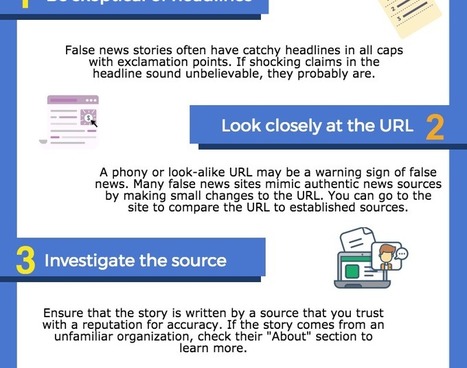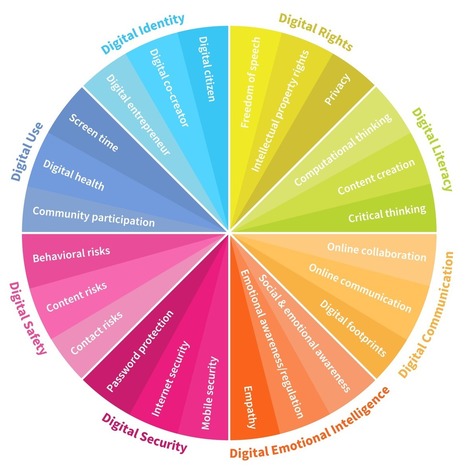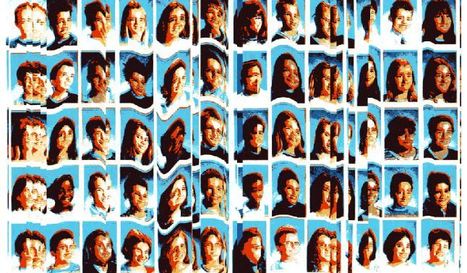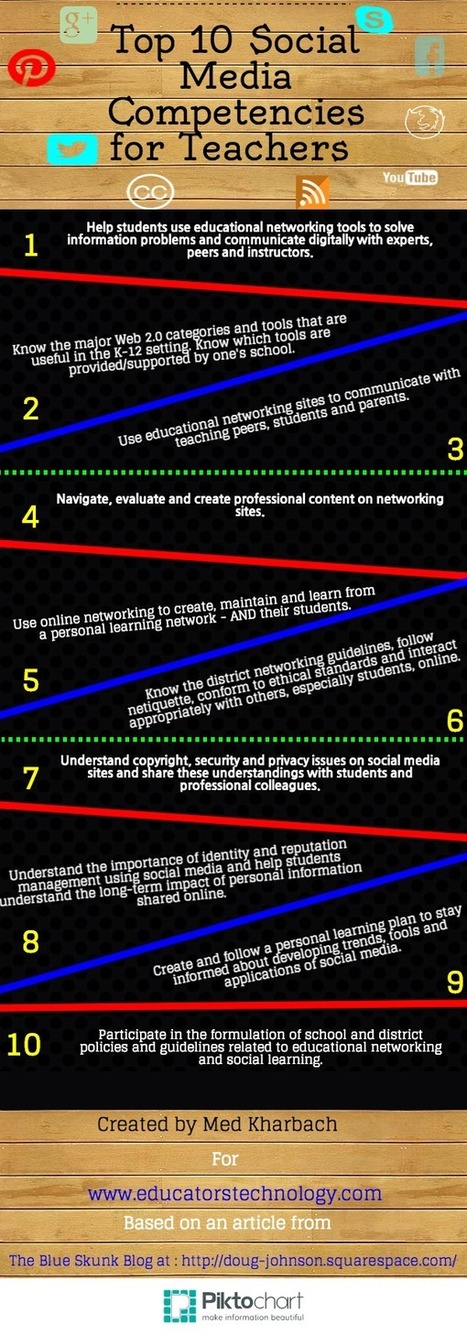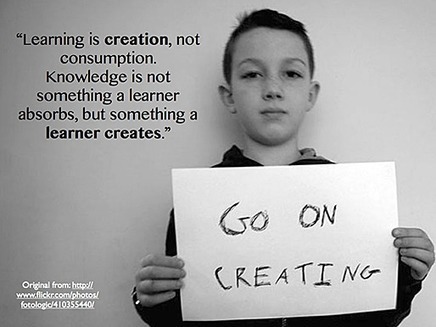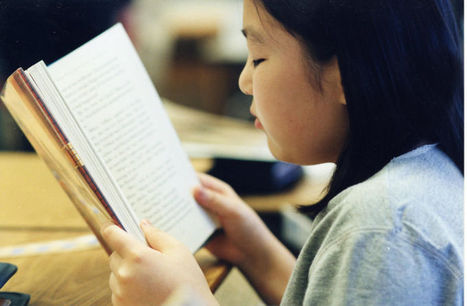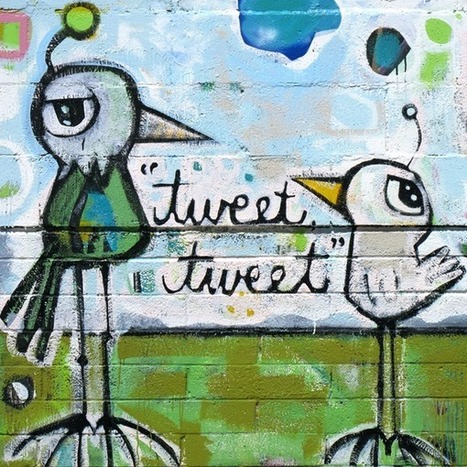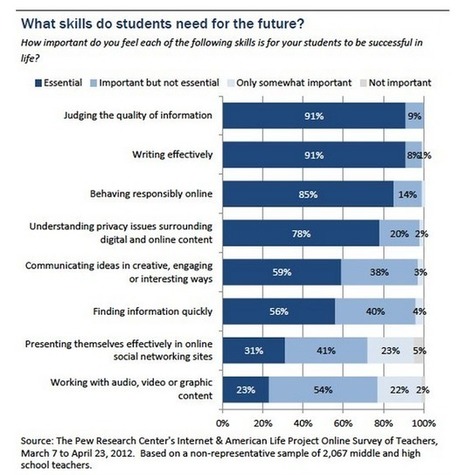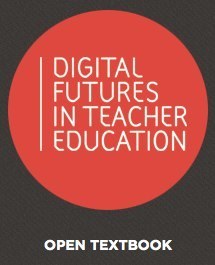 Your new post is loading...
 Your new post is loading...
Why does digital illiteracy seem acceptable in education?
... We should finally drop the myth of digital natives and digital immigrants. As I said in my blog, in the context of issuing guidance to parents about e-safety: "I'm sorry, but I don't go for all this digital natives and immigrants stuff when it comes to this: I don't know anything about the internal combustion engine, but I know it's pretty dangerous to wander about on the road, so I've learnt to handle myself safely when I need to get from one side of the road to the other." The phrase may have been useful to start with, but it's been over-used for a long time now. In any case, after immigrants have been in a country for a while, they become natives. We've had personal computers for 30 years, and I was using computers in my teaching back in 1975. How long does it take for someone to wake up to the fact that technology is part of life, not an add-on? ...
Free resource of educational web tools, 21st century skills, tips and tutorials on how teachers and students integrate technology into education
By Christina Gil - Fake and inaccurate news has become increasingly widespread. In this post we explore ways to teach students to recognize fake news.
The digital content they consume, who they meet online and how much time they spend onscreen – all these factors will greatly influence children’s development.
We often hear people talk about the importance of digital knowledge for 21st-century learners. Unfortunately, many focus on skills rather than literacies. Digital skills focus on what and how. Digital literacy focuses on why, when, who, and for whom.
For example, teaching digital skills would include showing students how to download images from the Internet and insert them into PowerPoint slides or webpages. Digital literacy would focus on helping students choose appropriate images, recognize copyright licensing, and cite or get permissions, in addition to reminding students to use alternative text for images to support those with visual disabilities. ...
Student blogging provides opportunities for sharing, reflection, and ownership. With ELLs, blogs can provide deeper engagement and a public forum to demonstrate their developing skills.
In the social media universe, blogging is potentially the most powerful tool. Time and again, blogging is proving its worth in education and training, with countless learners discovering that sharing their ideas, sharing content and discussion ideas worldwide has a whole range of benefits. Blogging requires a particular set of literacies to ensure that its potential is realised. One of the new digital literacies bloggers need is the ability to encapsulate ideas succinctly and in a form that is accessible and engaging. Another literacy is the ability to be able to devise posts that draw an audience and provoke responses. One of the most powerful aspects of blogging is its social dimension which includes open discussion. Still another is the skill of managing those responses and replying in a way that promotes further discussion and sustains the discourse.
A recently released Pew Research study shows that young people (age 16-29) are reading morethan many people think they are, and that much of what they read nowadays is on a screen rather than on paper. Most of these young people who read using a screen read on their phones or their computers rather than on eReaders ...
Tweet from Earth Pics (screenshot preserved for when it gets taken down). Retweeted over 1,000 times in the first hour. Seth Dixon's insight: This is a real island...well, sort of. It is an island off the coast of Thailand (most certainly not Ireland) and there is no castle on the top. Photoshopping and easy file sharing make it harder to assess the validity of online resources (this fantastic digital manipulation is the work of Jan Oliehoek). Most students start their research with online sources. This isn't to pretend that that I've never mistakenly assumed that some online content was accurate when it wasn't true; I think we all have. I think that it's an important conversation to have with our students so they can be more critical consumers of online information and use some geographic skills to assess the quality of that information.
I also believe that encouraging students to get 'hands on' with authentic apps has a much more important role in helping them to develop digital literacies which they can use outside of the classroom.
Via Nik Peachey
Digital literacy is about more than just adding technology into the teaching we already do. The following common teaching practices that we have seen in classrooms as researchers and as parents of school-age children do not help develop digital literacy and may even kill students’ motivation to develop their savvy use of technology and the Internet. We must stop these practices. Immediately.
Via Nik Peachey
From understanding what digital literacy is, to developing skills and establishing ethical principles for students, our live chat panel share ideas and resources for universities
|
The different ways that parents are handling their kids’ use of tech is creating three distinct types of tech users, says Alexandra Samuel.
The era of the digital native is over. If that declaration comes as a relief, you’re most likely either an older tech user who is tired of feeling irrelevant, or a millennial frustrated with being reduced to a headphone-wearing cliché. In 2001, education consultant Mark Prensky coined this term — along with calling the analog-raised generation “digital immigrants” — to alert teachers to the emerging wave of students who’d be arriving at schools with new ways of thinking and absorbing information after growing up with computers, videogames, digital music players, video cams, cell phones and other devices. ...
Denzel Washington was recently quoted as saying, “If you don’t read the newspaper, you’re uninformed. If you do read the newspaper, you’re misinformed.” So what should you do? You want to be informed, but a good deal of the information out there is incorrect or biased. Here are some things to keep an eye out for when reading a news article.
Each year more of our students become tethered to electronic devices for communication, entertainment and information. This connectivity opens up a channel to learning, but it also invites a barrage of media messages that students must learn to interpret.
How does documenting learning have an effect on awareness, skills and developing habits around the so called 21st century “Now” literacies?
Med Kharbach lists 10 essential social media skills for teachers of all sorts in a creative infographic, based on an article by Doug Johnson.
‘Fluency’ derives from the word ‘flow’ and when we think about being ‘fluent’ in any context, it refers to being flexible, accurate, efficient, and appropriate. In other words, the way we use skills, language and speech flows naturally and easily. In a digital context for learning, fluency involves using technologies “readily and strategically to learn, to work, and to play, and the infusion of technology in teaching and learning to improve outcomes for all students”...
Google is usually one of the first places students turn to when tasked with an assignment. Whether it’s for research, real-time results, or just a little digital exploration … it’s important they know how to properly Google. Lucky for teachers (and students, of course), Google has a handy set of lesson plans that are just waiting to be unleashed upon the leaders of tomorrow.
"“The best thing to invest in if you want to improve the use of technology in a school is connectivity and teacher training.”"
We take it for granted as English language teachers that we need to develop our students’ reading skills, but in most cases the nearest our students get to reading online is a printed version of a web page pre selected by their teacher. At best they may actually get to see a pre selected page on the screen of a computer, but is this enough to really develop their digital literacies?
Via Nik Peachey
Writing used to be strictly an in-school activity. Now, kids do 40 percent of their writing outside of school. Called “life writing,” young adults’ social writing spans texts, tweets, social media, and blogs -- and all of it’s making kids more literate.
Via Nik Peachey
In a recent research article published by PEW Internet under the title " The Impact of Digital Tools on Student Writing and How Writing is Taught in Schools ", 91% of teachers surveyed report that " judging the quality of information " as the top of the digital skills students need for the future. Similarly, another 91 report that "writing effectively" as being essential skill for students while 54 % of teachers think that working with audio, video or graphic content as being important but not essential. Read the full report at http://pewinternet.org/Reports/2013/Teachers-technology-and-writing.aspx
Via Dr. Susan Bainbridge
There are practical guides to help facilitate accessibility for a wide audience and a visual map of resources that are hyperlinked to content to aid navigation. Suggestions of how to use this resource are offered as starting points for you to explore the themes, issues, literature and content and there is guidance to help you re-use this content within your own practice.
Via Nik Peachey
|



 Your new post is loading...
Your new post is loading...



